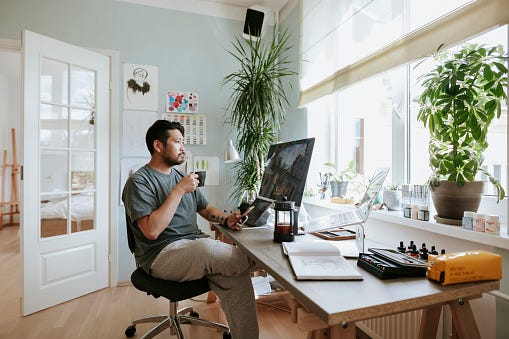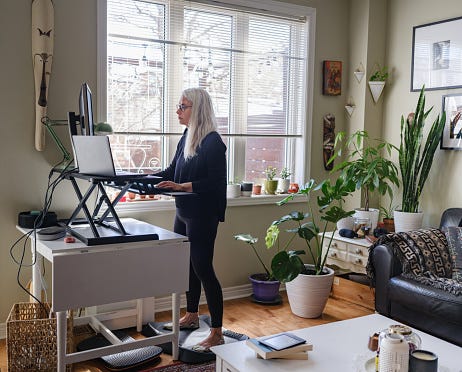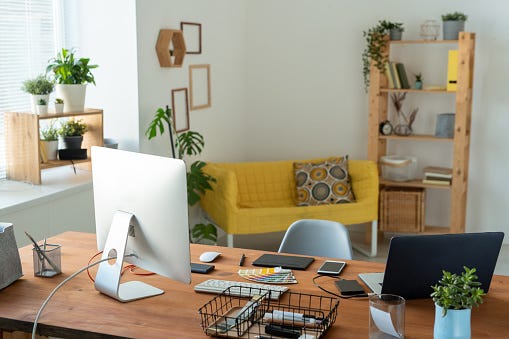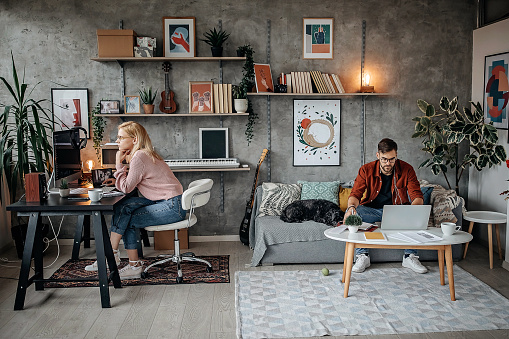Sadly during a deadly pandemic, the rich got richer and the poorer got poorer.
Is covid discriminatory? Yes and no.
Now the top 1% own over 50% of the nation’s wealth while the bottom 90% own less than 10%.
Despite America being the wealthiest nation in the world, this money is not evenly distributed.
The newly defined ‘laptop’ elite educated white class benefited the most from the pandemic.
This group not only had the luxury to work from home, but took advantage of the soaring 13+ year bull market from the couch, housing boom, low-interest-rate environment, alternative investing sales in artwork to NFTs, took more time off, and arguably their lives became richer in the process.
Although the laptop class’ creativity, inventiveness, innovation, and inspirations drive the world and we would not be here without them, they’ve also harmed those that keep their businesses and fortunes growing.
From subscriptions to online ordering, private flying to delivery, the laptop class was demanding at home.
Without essential workers, the laptop class would be on the front lines, not on Zoom in Bali. Lockdowns have exacerbated the wealth, pay, gender, and racial inequalities further as the most vulnerable, impoverished, less educated, and financially stable were left on the sidelines not able to take advantage of what the laptop class capitalized on.
The income and wealth disparity widens during every recession and unsurprisingly, the top 10% and above eventually come out stronger every time.
Is the upper-class to blame for economic downturns? Many times yes.
With too much greed, overreliance, lofty expectations, bets, and ‘play money’, financial collapses have come about.
During the dot-com bubble to the 08 housing crisis, despite investors and bankers under pressure and losing their jobs and capital in high-flying stocks through uneducated lofty bets, those who were prudent and diversified survived and came out better than ever. During the pandemic, those who were fortunate enough to work from anywhere, not only saw their wages increase, but their savings, income sources, and assets multiplied.
2020–2021 was a time of free cheap money and they took advantage of it with this ‘extra’ time on their side. On the other hand, essential workers, people of color, and minorities were most affected financially, mentally, and physically by the pandemic. They were not only more exposed to the deadly virus, they had no choice but to continue going to work and physically do so and trade their time.
As I have said since circa December 2020, if the pandemic taught us anything it is to plan for the worst, hope for the best. Americans aren’t great at doing that. They prefer to live on the edge with an average of less than $1k in savings and nothing in the retirement fund until middle-age.
Within a few months of the pandemic, savings stockpiled and the national savings rate rose to a staggering 30%. Millions adopted the freelance lifestyle as a part of the gig economy and invested in the stock market. Millions of accounts were opened on retail trading platforms, second homes were purchased, and inflation didn’t stop anyone from revenge spending.
All of this spending, pent-up demand, and abrupt recovery was fueled by fiscal and monetary stimulus. On the fiscal side, stimulus checks were delivered, PPE loans for business relief from the government and Congress and low-interest rates and QE from the Fed and central bank’s efforts. These forms of stimulus certainly aided all income classes but as with everything, those who take advantage of it the most tend to not need the support.
Millions in stimulus loans for small businesses were stolen and used in fraudulent ways and stimulus checks were delivered to those who didn’t qualify. If there’s a will, unfortunately, there’s a way and some bad actors took advantage of it.
At least Americans have stated they are in a better financial position than in pre-pandemic. I don’t want to be the badger of bad news but optimism may not prevail going into 2022 with fears of a dot-com bubble, Fed 3x rate hikes, curbing of the bond-buying program, Big Tech monopoly Congress crackdown fears, and hyperinflation.
It’s not a completely wise thing to stay financially present but at least it keeps Americans hopeful. Investors neglect this sentiment completely. No wonder they are better off for the most part financially. They are only looking towards the future. Way ahead of themselves trading futures.

The Height of the Laptop Class
The laptop class is a perceived new class that sprang out of the pandemic lockdowns. They either always worked in an industry that offered remote work before it was popular such as freelancing or tech or in an industry that could easily transition to it in no time.
It isn’t an actual term or designated class but two words put together that accurately describe a group of well-off individuals who are not only able to earn more income at once, sometimes working multiple full-time jobs which I don’t recommend, but those who have a better work-life balance, WFH option, more savings, financial security, and availability in terms of their schedule which allows them to earn more from their brainpower, not manual power.
WFHomers reportedly stayed the longest in their job and were able to maintain their employment with little personal risk to their health and livelihood but that doesn’t include mental health struggles that have proliferated. Although it may be difficult to feel any remorse for the laptop class, they did struggle as well. Money doesn’t solve everything.
More money = more problems.
They were inclined to work harder to prove themselves and at home were concerned they would not be paid as well since they weren’t physically present in the office and had the option to pay zero income tax living in Florida. Plus those that had this luxury didn’t see it as one since they might have forced themselves to work longer hours to take advantage of this free time they would never get back. I had massive regret during lockdowns with my time that starting and experimenting with any venture was a proven solution but caused burnout along the way.
Although the laptop class is essential in a different way in empowering the world’s innovations and using their degrees and brainpower to keep the world running, they were seen as aristocrats sitting high in their castles behind webcams and Zoom backgrounds directing and monitoring their employees who risked their lives feeding upper-class’ lives.
The laptop class not only went on the most excursions, but also flew private, caused asset prices to soar and markets to become ultra frothy, overpriced, and propelled inflation, they had the most flexibility, comfort, and security. Workforce automation worked in their favor in this day in age and they certainly benefited the most from a financial perspective.

At Home
Currently, more than 4.7 million people work remotely at least half the time in the U.S. This was surprisingly low as I predicted more workers are turning to white-collar jobs to get back their time, sanity, and power.
Thanks to technology, work expectations, and hybrid work styles, work-life balance and the meaning of work have changed. Of course, we never want a pandemic to occur, yet logically speaking, the pandemic happened at a decent time in history with the abundance of technology resources available at our fingertips for a relatively low-cost or zero cost.
If video conferencing, messaging platforms, retail investment platforms, or streaming services weren’t around today, we wouldn’t have survived this long. It’s another question if workers are actually more productive, fulfilled, efficient, and happier at home but what we can all agree on is that they are more comfortable and feel in charge of their lifestyle this way. I believe the ultimate source of freedom isn’t money, it’s time. Once you have more power over your schedule, you are truly rich something the laptop class has the most of thanks to passive income and the markets.
Globally only 16% of companies are fully remote according to an Owl labs study. Over 62% of workers aged 22 to 65 claim to work remotely at least occasionally which is surprisingly higher than in the U.S. despite more opportunities and technological hubs located here such as Silicon Valley. The study also found that 44% of companies do not allow remote work of any kind.
The companies that do not allow remote work of any kind are exceptions since they are found in industries that cannot be fully automated or remotely operated such as essential workers in the emergency room, doctors, dentists, some teachers, healthcare industry, delivery manufacturing, production, real estate, truck driving, retail, and consumer staples in-store, hospitality, tourism, etc.
These workers have less freedom over their time and although earnings can be as high as for remote workers in industries that can be done from anywhere most notably in engineering, occasionally finance, consulting, and law, it is harder for them to grow their financial nest egg and take advantage of the time the pandemic has offered to enrich their lives outside of work.
Here are some stats from the laptop class that may surprise you:
-Remote employees saved an average of 40 mins daily from commuting
-Close to 70% of full-time workers have turned to work from home
-Only 20–25% of companies pay for the cost of home office equipment
-60% of people believe they would choose an employer based on remote work options
-23% of those surveyed from Owl Labs stated they would take a 10% pay cut to work from home permanently
-People have saved on average $500 per month at home $6k per year (hold on-remember, it’s always spent somewhere! )
Unsurprisingly, remote employees reported having more anxiety, burnout, fatigue, lack of purpose, and overall imbalance in their lives. With too much time spent at home, we can all go stir crazy with cabin fever. Multitasking also reduces our productivity and brain capacity.
Less = More and lockdowns may have helped fuel our investments but not always our brains.
Without mental sanity and clarity, we have nothing so was the laptop class really better off?
Being in-person is not only crucial for kids’ development but for adults too. Humans are social creatures and we need to be around one another to spark creativity, happiness, peace, feel present, and find a separation between work and home. Not that working from home isn’t fun and relaxing, but being distracted, lazy, unmotivated, and showing a lack of interest are more common at the home office setup.
Once NYU went remote for a year and a half, I saw a decline in my cognitive performance, energy, and motivation. Remote school is just not the same online, especially at the same cost as in-person! Even though I saved roughly $5k on commuting and $60k a year on rent, sometimes it’s worth it to spend money especially when it is funneled through a tax-advantaged plan, a 529 which is dedicated for college and meant to be spent! Not everything free and convenient is better, especially for our mental health.
Wasting time helps us explore and be more creative than tackling another freelance job and skipping the commute.

Laptop Class Regrets
All good things must come to an end and thankfully lockdowns didn’t last long. Once vaccinations rolled out, WFhomers were burnout enough, and offices that didn’t need to be reopened, opened anyway.
Remote school was convenient for a few solid weeks then it dawned on me how vital the atmosphere and environment of campus life really is to my college experience. I can learn all this material at a faster pace and in a more in-depth realistic way than any classroom can teach anyway. I am mainly at school for the fully in-person experience. To be present and enjoy what’s offered. Networking, meet-ups, adventures, extracurriculars, and new faces make it special especially in the city. For full-time employees, they’ve felt the same way. The pandemic may have been seen as a blessing in disguise to add more income sources and assets into the portfolio, but after a while, we get used to everything, and what we once craved now caused more havoc on our health and social lives. More focus, concentration, and enjoyment are stronger in a dedicated workspace. Setting a boundary is important.
So has productivity and happiness waned or skyrocketed for the laptop class?
Although their financial buffers and homes may have grown, many managers globally have stated productivity has not only decreased on average for their employees but concentration and response times have become stagnant as well.
Ultimately in response to this, I would say the largest and possibly only advantage that laptop class really had was more financial flexibility and security although that is up for debate as well since they certainly didn’t stop spending!
It’s not how much you earn, it’s how much you keep.
Becoming too audacious and proud of your investment returns and wage growth could’ve dampened growth in itself. Mental illness only went up, in some regards, more time was wasted multitasking, fulfillment could’ve waned, and more traveling was done by those with more disposable income a.k.a the laptop class which meant their exposure to covid was heightened.
Back in March 2020, the first person I had heard who had covid was Tom Hanks. A celebrity who I’m sure did not stay in 1 place for a year let alone a week. Flying private and stuck in an Airbnb on an island elevates one’s risk right away. Once you leave the house, you are already at risk.
You never know where it comes from. The more money one has, the more they want to spend which means do which translates to more potential exposure to the virus. No one was safe.

Too Good To Be True?
I don’t know about you but no matter what I’m doing at home, there’s always something more to do. Whether it be renovations, improvements, cleaning, or multitasking, there’s an endless at-home list. Ironically, the last place I can concentrate or truly relax is at home!
At the start of the pandemic, lockdown seemed cozy and a new way of life. I was excited to do school from my kitchen and start a few side projects such as this blog, the best thing that came out of 2020! The laptop class was ready to become the best workaholics they could be. They were pumped to use up their most efficient energy and productive hours on work instead of on their commute and could eat when they were hungry at home not what the clock said.
Yet this anticipation and convenience slowly deflated. Remote work can never be fully replaced and this concern has led the workforce to reconsider their options leading to the Great Resignation and preference towards a hybrid approach, an approach that seemed foreign to many industries pre-pandemic.
According to Mercer, a workplace benefits consulting firm, 94% of employees from 800 employers surveyed stated workplace productivity was the same or higher since employees started working from home. Having the option to telecommute is a no-brainer for an employee. This leads to higher job satisfaction and retention that not only boosts the company’s revenue but also allows employees to feel and work better. Those working at home only reported elevated happiness levels of 22% than workers who work on-site in an office environment.
The things we thought were annoying before have now become activities we crave! We are constantly convinced something is better and never satisfied! I guess this keeps us going.
Isn’t it disappointing how we don’t appreciate things until they are gone such as a commute, in-person meeting, and long Sweetgreen line? Okay maybe not waiting in line in the freezing cold for a $30 salad but you get my point.
Remote workers reported having a better work-life balance, income streams, stronger wages, and more ‘free’ time but with less focus and happiness overall.
Retention is crucial for both sides leading a hybrid working model to gain the most attraction from the laptop class. Although being a part of the laptop class is a privilege in some respects as pressure is seen as a privilege, Millennials, in particular, are fleeing away from it especially in cities unable to deal with no interaction and only their gadgets all day.
They are willing to compromise lost time for more connection, a better reward any day. After all, kings and queens stuck in their castles aren’t any happier than their servants.
Overall, we cannot forget covid lockdowns failed to protect the vulnerable and essential workers. Along with the roughly 5-month learning gap for remote students, blue-collar workers’ health was compromised the most.
Our health dictates how we survive and as the laptop class ordered more and attempted to portray their best lives on TikTok, minimum wage workers, pay-check to pay-check employees, and essential workers in and out of the hospital risked their lives for the beachfront laptop Peloton Zoom everything upper-class.
Our health keeps our lives in perspective. No matter if you Zoomed from the Hamptons all year long or delivered packages, we all went through something. The grass isn’t always greener on the other side. No matter how lofty your balance sheet may have grown, without our health we have nothing. Don’t be jealous of sitting in front of a screen all day. It’s fun for a few days then becomes draining. Plus it’s not any healthier. Research finds sitting is the new smoking.
For satisfaction, stability, sanity, and true comfort, in-person connection is needed more than ever. A higher paycheck and more ring lights do not make you immune from any physical or mental disease.
Lockdowns reminded us how impactful our mental health is on our livelihood, how everyone plays a crucial part in driving the economy, life is unfair, every job is important, why in-person connection will always be a winner, and how mental illness can be as lethal as a mutating virus. Never judge a book by its cover nor be jealous. You never know what someone is going through.

